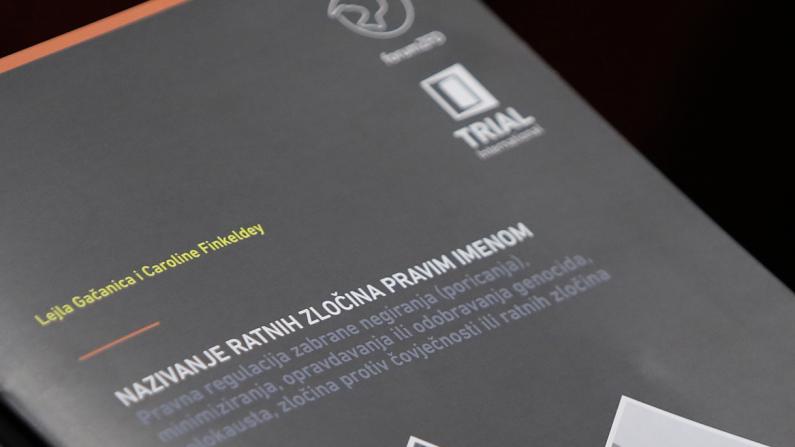
It is the aim of ForumZFD and its partner organisation TRIAL International to change the current public discourse and raise awareness on the necessity of sanctioning denial of war crimes.
As a first step both organisations publicly presented the joint publication in front of more than 100 guests, among them representatives of civil society, local and international institutions and embassies. The publication was written by Lejla Gačanica and Caroline Finkeldey and describes the situation in Bosnia and Herzegowina, similar laws in European countries, law initiatives in Bosnia and Herzegovina on this issues – which have all failed so far – and gives recommendations. ForumZFD and TRIAL international argue for a special law on state level as best solution, but are aware that it needs further steps and efforts beside a law, for example in the field of education, culture, naming of public places and institutions, monuments, media.
Similar opinions were voiced by the panel discussants; Midhat Izmirlija, assistant professor at the faculty of law of Sarajevo university reminded that a law alone – even i fit was implemented – would not solve the problem, a responsible culture of remembrance needs to be established alongside. Valentina Gagić from Srebrenica urged to introduce an institutional solution. „We have tried for a long period to approach this issue on an individual basis, but we are running out of time. Institutions and media have much more influence than normal people“, she said. It was disappointing that a quarter of a century after the Srebrenica genocide it is still impossible to acknowledge facts established by courts in textbooks and public space, said Denis Džidić, director of Balkan Investigative Reporting Network (BIRN) BiH. „On the contrary, we are running risk that the denial of genocide will be institutionalized“, he added.
The author of the publication, Lejla Gačanica, commented that „we still do not deal honestly with the past, are threatening with violence if need by, ignoring verdicts of the International Criminal Tribunal for the former Yugoslavia and empathy for all victims of war crimes“. Besides introducing a law on sanctioning the denial of war crimes it would be important to raise the awareness of the society.
This is what ForumZFD and International in Bosnia and Herzegovina aim at. More discussions in other locations in Bosnia and Herzegowina are to follow.
The publication can be downloaded under the following links in English and BHS languages.